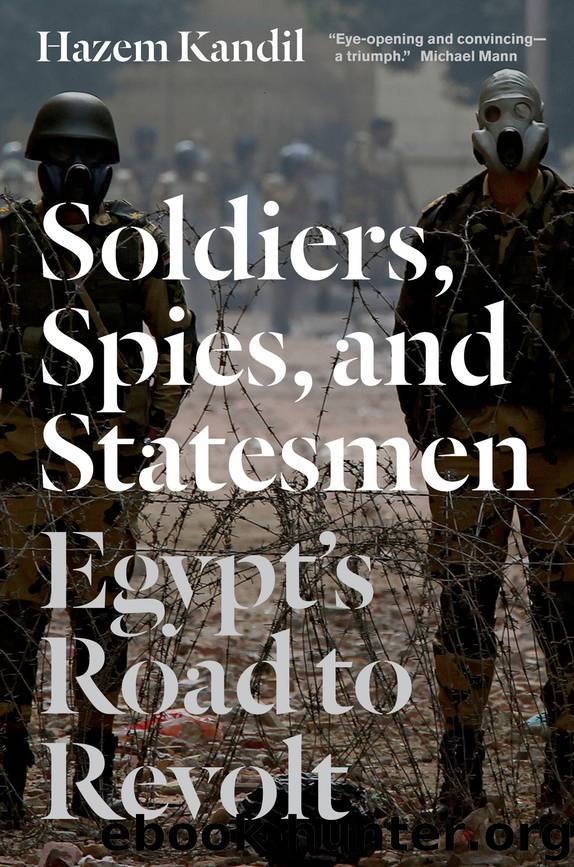Soldiers, Spies, and Statesmen by Hazem Kandil

Author:Hazem Kandil [Kandil, Hazem]
Language: eng
Format: epub
ISBN: 978-1-84467-962-1
Publisher: Verso Books
Published: 2014-03-25T04:00:00+00:00
BACK TO THE HOME FRONT
Although the umbrella of American protection was meant to substitute military protection for the political apparatus—i.e., it substituted the function of the military in the ruling alliance—one still has to remember that in a tripartite ruling bloc reducing the weight of one party (in this case the military) requires increasing that of the two other partners (i.e., the political and security apparatuses). So even as the president was reaching out to the United States, he was considering how to strengthen domestic power brokers. Empowering the Interior Ministry to handle domestic repression was a straightforward task. Less obvious, however, was what to do with the ruling party. The Nasser-built Arab Socialist Union needed rehabilitation, not just in terms of structure, but also—more fundamentally—in terms of its social base. The ASU that Sadat had inherited from his predecessor relied mostly on state functionaries (party cadres, bureaucrats, and public-sector workers) and middling landlords. These were no longer sufficient. For one thing, public functionaries—some 3.2 million in 1978—were likely to remain neutral when their employers bickered, as was proven in May 1971, when the president and his ministers fought it out and government cadres remained paralyzed, not knowing which side to support. Also, village notables (an estimated 3,600 middling landowners) had been—and would likely remain—provincial in outlook. They could garner votes in their home districts, or march out to welcome government dignitaries, but they certainly lacked the interest or the capacity to intervene in national political struggles. Hence, the support of public functionaries and village notables could only be subsidiary. The ruling party now needed an active social base that identified its interests with those of the party and would be ready to fight for them when necessary. In short, Egypt needed a new political elite.
What should this be? Reverting back to the military to staff the political apparatus, as was the case before the changes brought about by the ASU in 1962, was out of the question. The whole point behind revamping the ruling party was to counterweigh the military. Bringing in police officers to do the job would end the relative autonomy of the political apparatus, which the president represented; it would spell the end of politics. While security officers would now be exclusively responsible for rooting out domestic contenders, they could not be charged with actually running the government. Besides, even if a political order could survive for a while on naked coercion, its long-term stability required a broad social alliance. Because Sadat wanted a loyal social base that owed nothing to Nasser, and because he knew that opening up the economy was a nonnegotiable item on the American agenda, he resolved to entrust the ruling party to the hands of an emerging capitalist class. As the Middle East scholar Raymond Hinnebusch put it, “Sadat, lacking the stature to pursue Nasser’s centrist balancing act between elite and mass, needed a solid support base underpinning his legal authority; since his rivals were on the left and his potential
Download
This site does not store any files on its server. We only index and link to content provided by other sites. Please contact the content providers to delete copyright contents if any and email us, we'll remove relevant links or contents immediately.
| Africa | Americas |
| Arctic & Antarctica | Asia |
| Australia & Oceania | Europe |
| Middle East | Russia |
| United States | World |
| Ancient Civilizations | Military |
| Historical Study & Educational Resources |
Empire of the Sikhs by Patwant Singh(23065)
The Wind in My Hair by Masih Alinejad(5084)
Rise and Kill First by Ronen Bergman(4766)
The Templars by Dan Jones(4676)
The Rape of Nanking by Iris Chang(4193)
12 Strong by Doug Stanton(3541)
Blood and Sand by Alex Von Tunzelmann(3184)
Babylon's Ark by Lawrence Anthony(2666)
The History of Jihad: From Muhammad to ISIS by Spencer Robert(2614)
No Room for Small Dreams by Shimon Peres(2355)
The Turkish Psychedelic Explosion by Daniel Spicer(2349)
Inside the Middle East by Avi Melamed(2347)
Gideon's Spies: The Secret History of the Mossad by Gordon Thomas(2329)
Arabs by Eugene Rogan(2291)
The First Muslim The Story of Muhammad by Lesley Hazleton(2257)
Come, Tell Me How You Live by Mallowan Agatha Christie(2244)
Bus on Jaffa Road by Mike Kelly(2144)
1453 by Roger Crowley(2018)
Kabul 1841-42: Battle Story by Edmund Yorke(2014)
